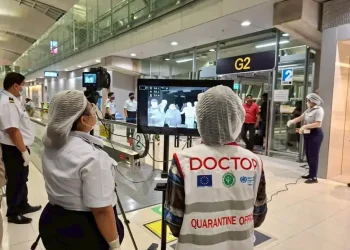Conspiracy theories about COVID’s origins are endangering future pandemic response
Written: August 1, 2025 – 14:00 ET
Conspiracy theories surrounding the origins of COVID-19 continue to circulate globally, despite mounting scientific evidence pointing to natural animal-to-human transmission. While this misinformation persists, it is eroding trust in public health institutions and weakening global preparedness for future pandemics.
WHO-led report supports natural origin theory
In late June, the Scientific Advisory Group for the Origins of Novel Pathogens (SAGO)—an expert panel convened by the World Health Organization—released a detailed assessment of SARS-CoV-2’s origins. After extensive review, SAGO concluded that a zoonotic origin—meaning a spillover from animals to humans—remains the most scientifically supported hypothesis.
Crucially, the panel found no verifiable evidence supporting the theory that COVID-19 resulted from intentional laboratory manipulation or a biosafety breach. This finding aligns with previous independent studies published since 2020 that have consistently linked the virus’s emergence to the Huanan Seafood Wholesale Market in Wuhan, China.
Scientific studies targeted by conspiracy theories
One of the most cited early studies on COVID-19’s origins appeared in Nature Medicine in March 2020. Authored by a group of virologists and evolutionary biologists, the peer-reviewed paper evaluated multiple hypotheses, ultimately supporting a natural spillover as the most likely scenario.
While the possibility of a lab-related incident was also considered in the paper, researchers found no genomic indicators of artificial manipulation, and identified viral features consistent with natural evolution.
Despite its scientific rigor, the study quickly became a lightning rod for misinformation and political attacks. False narratives began to surface, alleging that researchers were pressured to suppress lab-leak discussions in exchange for funding or favor. These accusations, however, lack evidence and ignore the transparent scientific process that underpinned the paper.
The growing body of evidence for natural spillover
Over the past five years, an increasing number of studies have deepened the understanding of SARS-CoV-2’s origins. These investigations draw from genetic sequencing, environmental sampling, epidemiological mapping, and analysis of live-animal trade networks in China.
Key findings include:
- Genomic comparisons showing that SARS-CoV-2 shares features with other known coronaviruses and lacks markers typical of laboratory engineering.
- Geographic clustering of early COVID-19 cases in December 2019 around the Huanan market in Wuhan.
- Environmental samples from the market tested positive for both SARS-CoV-2 and genetic material from raccoon dogs and civets—animals susceptible to coronavirus infections.
- Parallel origins with earlier zoonotic outbreaks, such as SARS-CoV-1, which also emerged in southern China via the wildlife trade.
A 2022 study co-authored by the original Nature Medicine team demonstrated that positive samples were concentrated in market areas where live animals were sold. A follow-up study in 2024 showed that these same samples were located on surfaces that had also tested positive for animal DNA. While not conclusive proof, these findings are highly consistent with animal-to-human spillover at the market site.
The dangers of false narratives
Despite this growing evidence, the theory of a lab leak remains prevalent in public discourse, especially on social media platforms and partisan outlets. In many cases, scientific uncertainty has been exploited to promote conspiracy theories, casting doubt on institutions like the WHO, U.S. Centers for Disease Control and Prevention (CDC), and National Institutes of Health (NIH).
This false equivalence between scientific evidence and speculative theories has real-world consequences. Conspiracy-driven skepticism has:
- Eroded public trust in scientific research and health guidance.
- Fueled anti-vaccine movements, undermining public health campaigns.
- Driven political decisions that weaken pandemic preparedness infrastructure.
For example, in the U.S., conspiracy narratives have contributed to budget cuts for federal health agencies, including CDC and NIH, and to withdrawals from global collaborations like the WHO and USAID.
Disinformation threatens future readiness
Perhaps the most dangerous outcome of persistent misinformation is its effect on future pandemic readiness. By diverting focus from proven risk factors like wildlife trade and habitat encroachment, lab-leak conspiracy theories distract from the reforms and investments that could help prevent the next outbreak.
Global health experts warn that dismantling surveillance programs, reducing research funding, and cutting international aid—based on flawed narratives—will leave nations less equipped to detect and respond to emerging threats.
The idea that a global pandemic emerged from a lab leak involving accidental infection lacks compelling evidence and defies the broader scientific consensus. In contrast, zoonotic transmission remains the most plausible and historically consistent explanation for outbreaks of this scale.
Moving forward with science-based preparedness
To strengthen global defenses against future pandemics, public trust in science must be restored. This includes:
- Transparent communication about uncertainties and ongoing investigations.
- Sustained funding for research into zoonotic viruses and pandemic detection systems.
- Global cooperation through organizations like the WHO and international research networks.
- Regulation of wildlife trade and wet markets, which remain high-risk environments for virus spillover.
Reinforcing evidence-based approaches, rather than speculative or politically motivated theories, is essential to maintaining public health resilience.
Conclusion
The origins of COVID-19 have been rigorously examined by global experts, and the majority of data continues to point toward a natural animal spillover. While scientific inquiry must remain open to all plausible theories, it’s critical that conclusions are drawn from evidence—not ideology.
Conspiracy theories may offer simple answers to a complex crisis, but they ultimately jeopardize our ability to learn from the past and protect the future. As we look ahead, prioritizing truth, science, and preparedness is the only sustainable path forward.
This article was rewritten by JournosNews.com based on verified reporting from trusted sources. The content has been independently reviewed, fact-checked, and edited for accuracy, neutrality, tone, and global readability in accordance with Google News and AdSense standards.
All opinions, quotes, or statements from contributors, experts, or sourced organizations do not necessarily reflect the views of JournosNews.com. JournosNews.com maintains full editorial independence from any external funders, sponsors, or organizations.
Stay informed with JournosNews.com — your trusted source for verified global reporting and in-depth analysis. Follow us on Google News, BlueSky, and X for real-time updates.












